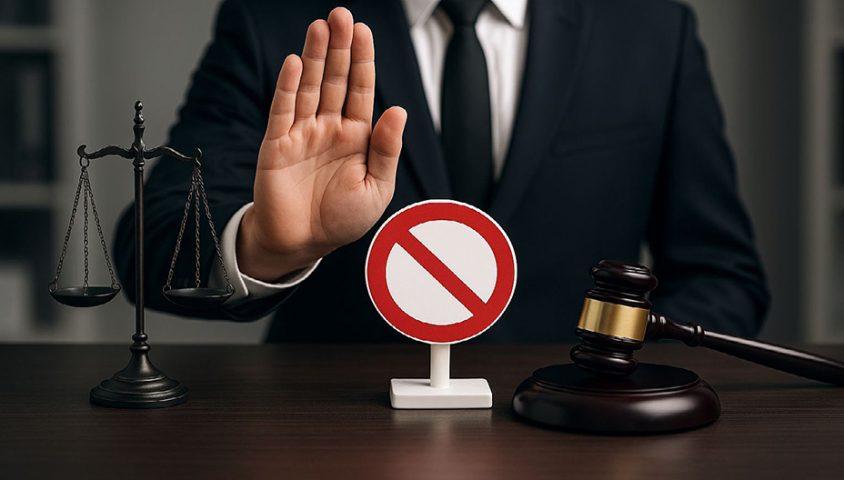
N7.T1 – Vesna Medenica Free to Travel Throughout Montenegro; Eight Judges Testify in Her Favor
08/05/2025
N7.T3 – Vetting in Moldova – Three Candidates Rejected in March
08/05/2025N7.T2 – Accountability of Judges and Prosecutors in Montenegro – A Rare Occurrence

HRA NEWSLETTER 7 – TOPIC 2
Do Montenegrin judges and prosecutors face consequences for irresponsible actions? It is necessary to raise this question, given that data indicates very few have been held accountable for errors in their work.
Last year alone, the Supreme Court found that the law was violated in 12 final criminal court rulings, with another four violations noted in 2025. Over the past 16 months, a total of 16 requests for the protection of legality submitted by state prosecutors were approved, demonstrating that courts issued decisions not grounded in the law.
The problem is that even when a judge acts unlawfully, it does not impact their performance evaluation. However, the Judicial Council informed the Center for Investigative Journalism of Montenegro (CIN-CG) that changes to the rulebook on evaluating judges are forthcoming, indicating that such violations should indeed influence the evaluation process.
In 2024, formal disciplinary responsibility for judges was confirmed in just one case. Nonetheless, the Supreme Court later overturned that decision and remitted the case for a new procedure. The last instance of a judge being definitively found disciplinarily responsible dates back to 2021.
Judges and prosecutors also evade accountability when they fail to report their assets to the Agency for the Prevention of Corruption. Over the past two years, no judge or prosecutor has faced disciplinary action for this lack of reporting.
“The Judicial Council’s interpretation—that failing to report assets once does not count as a disciplinary offense, and that intent to hide must be proven—essentially makes accountability impossible and creates opportunities for abuse,” stated Amra Bajrović, a legal advisor at the NGO Human Rights Action, in her comments to CIN-CG.
It is common for judges to avoid disciplinary proceedings by resigning—a practice acknowledged by the Ministry of Justice.
“There should be mechanisms to prevent this while respecting the Constitution and the law. Additionally, if there is suspicion that a judge or prosecutor has acted unlawfully, there are alternative procedures beyond disciplinary action,” the Ministry of Justice told CIN-CG, likely referencing potential criminal liability for abuse of office.
The situation is analogous in the prosecution service. Not one of the 17 justified complaints against prosecutors in the past two years resulted in accountability, according to the Human Rights Action report titled “Analysis of the Selection, Promotion, and Accountability of State Prosecutors in 2023 and 2024.”
Since the beginning of 2023, the Prosecutorial Council has rejected 20 proposals aimed at establishing accountability for prosecutors, and in one case concluded that no disciplinary offense had occurred. The last time a prosecutor was held disciplinarily accountable was in 2022, for a failure in executing their duties.
Bajrović further highlighted to CIN-CG that no clear distinction currently exists between disciplinary offenses and violations of the Code of Ethics.
“Disciplinary offenses are not clearly defined, allowing even serious legal violations to remain unpunished. It is essential to continue advancing amendments to the Law on the Judicial Council and Judges, as well as the Law on the State Prosecution,” she stated.
She emphasized that introducing a vetting process, combined with reinforcing disciplinary and ethical standards, could be a crucial step in rebuilding trust and strengthening the judicial system.
Moreover, several former judicial officials are currently under indictment for abuse of office, highlighting significant systemic issues and a lack of effective mechanisms for prevention and accountability within the judiciary. Bajrović stressed the necessity of implementing effective measures to eradicate corruption within the courts and prosecution offices.
These issues not only undermine public trust in the judiciary but also jeopardize Montenegro’s path toward European integration.
HRA NEWSLETTER 7
- N7.T1 – Vesna Medenica Free to Travel Throughout Montenegro; Eight Judges Testify in Her Favor
- N7.T2 – Accountability of Judges and Prosecutors in Montenegro – A Rare Occurrence
- N7.T3 – Vetting in Moldova – Three Candidates Rejected in March
- N7.T4 – Closing Chapter 23: What Else Does Montenegro Need to Do in the Area of Judiciary?
- N7.T5 – Salary Increase for Judges and State Prosecutors
- N7.T6 – The Judicial Council Did Not Allow Judges from the Special Department of the High Court in Podgorica to “Escape”
- N7.T7 – Tensions Between the Constitutional Court and the Supreme Court: A Joint Meeting as a Possible Solution
- N7.T8 – Human Rights Action Participates in Meeting with Venice Commission
- N7.BN – BRIEF NEWS






 English
English